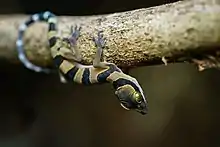Cyrtodactylus lekaguli
Cyrtodactylus lekaguli, also known commonly as the tuk-kai Boonsong bent-toed gecko, is a species of lizard in the family Gekkonidae. The species is endemic to Thailand.
| Cyrtodactylus lekaguli | |
|---|---|
 | |
| Cyrtodactylus lekaguli, tuk-kai Boonsong bent-toed gecko, on a tree | |
| Scientific classification | |
| Domain: | Eukaryota |
| Kingdom: | Animalia |
| Phylum: | Chordata |
| Class: | Reptilia |
| Order: | Squamata |
| Family: | Gekkonidae |
| Genus: | Cyrtodactylus |
| Species: | C. lekaguli |
| Binomial name | |
| Cyrtodactylus lekaguli L. Grismer, Wood, Quah, Anuar, Muin, Sumontha, Ahmad, Bauer, Wangkulangkul, J. Grismer & Pauwels, 2012 | |
Etymology
The specific name, lekaguli, is in honor of Thai herpetologist Boonsong Lekagul (1907–1992).[2][3]
Geographic range
C. lekaguli is found in southern Thailand, in the provinces of Phang Nga, Suret Thani, and Trang.[2]
Description
Large for its genus, C. lekaguli may attain a snout-to-vent length (SVL) of 10.4 cm (4.1 in). Adult females are slightly smaller than adult males, an example of sexual dimorphism.[2]
Reproduction
The mode of reproduction of C. lekaguli is unknown.[2]
References
- Cota M, Sumontha M, Duengkae P (2018). "Cyrtodactylus lekaguli ". The IUCN Red List of Threatened Species 2018: e.T104693320A104718626. https://dx.doi.org/10.2305/IUCN.UK.2018-2.RLTS.T104693320A104718626.en. Doenloaded on 26 November 2020.
- Cyrtodactylus lekaguli at the Reptarium.cz Reptile Database. Accessed 22 March 2018.
- Beolens B, Watkins M, Grayson M (2011). The Eponym Dictionary of Reptiles. Baltimore: Johns Hopkins University Press. xiii + 296 pp. ISBN 978-1-4214-0135-5. ("Boonsong", p. 31).
Further reading
- Grismer LL, Wood PL, Quah ESH, Anuar S, Muin MA, Sumontha M, Ahmad N, Bauer AM, Wangkulangkul S, Grismer JL, Pauwels OSG (2012). "A phylogeny and taxonomy of the Thai-Malay Peninsula Bent-toed Geckos of the Cyrtodactylus pulchellus complex (Squamata: Gekkonidae): combined morphological and molecular analyses with descriptions of seven new species". Zootaxa 3520: 1–55. (Cyrtodactylus lekaguli, new species).
This article is issued from Wikipedia. The text is licensed under Creative Commons - Attribution - Sharealike. Additional terms may apply for the media files.
